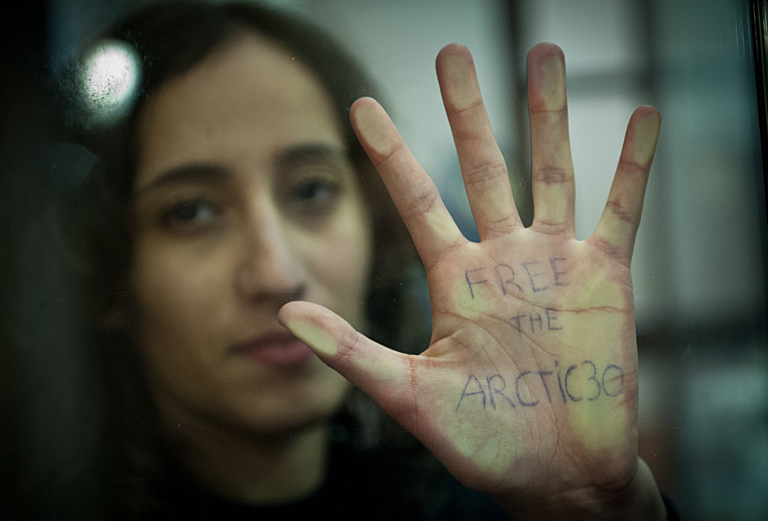Sometimes there are advantages to being ill-informed. Knowing embarrassingly little about why 30 Greenpeace activists were jailed in Russia in 2013, or the wilder assertions made by the broadcaster Alex Jones (emphatically not the woman from The One Show) meant that two documentaries this week unfolded for me like the twistiest – if not necessarily the most plausible – of thrillers.
Twenty-four per cent of Americans still doubt that the Sandy Hook massacre even happened
Then again, in my slight defence, such ignorance seemed to be what both programmes were assuming – because, unlike many documentaries, they didn’t summarise or give away the story they were about to tell. Instead, they stuck largely to a chronological approach in which each startling new development was allowed to startle us without any advance warning or hype.
About the only foot that On Thin Ice: Putin v Greenpeace put wrong was its weirdly flippant punning title. It opened in September 2013 when 30 Greenpeace campaigners were on the Arctic Sunrise ship preparing for what would prove a foolhardy operation to scale the first oil rig drilling in the Arctic – the foolhardy bit being that the oil rig was Russian.
As the activists acknowledged, they knew the action was illegal, but they were prepared for the 48 hours of detention they thought they might endure as a result. In the event, the Arctic Sunrise was invaded by heavily armed Russian special forces in a helicopter and towed to Murmansk, where all 30 were detained for two months while the authorities prepared charges of piracy, carrying a maximum sentence of 15 years.
At which point, things took a turn for the le Carré. One activist, Phil, had filmed the special forces illegally boarding a ship in international waters and still had the footage on an SD card inside his insole. He then put it under the false bottom of a matchbox he gave to his lawyer’s translator – a Pussy Riot supporter – to smuggle to the outside world.
But would even this do any good? Another interviewee was Igor, then head of comms for Gazprom, the company running the platform – although, as Igor told us, ‘Gazprom was Putin’. Igor also explained that Vladimir Putin wasn’t the reasonable man that the West wishfully thought at the time, but already a tyrant determined not to be pushed around by international opinion.
Nor did it help Greenpeace’s cause that the Murmansk courts were Putin too. Yet, while there was never much doubt who the baddie was, On Thin Ice did introduce the occasional note of moral complexity. Some of the activists, especially the ever-sceptical Iain, blamed the operation’s leaders for naivety and incompetence. And when, several more twists later, the 30 were released, this was by no means seen as a straight victory for the good guys. Oil-drilling in the Arctic, we were told, is now going gangbusters and nobody has protested on a Russian oil rig since (‘I haven’t, that’s for sure,’ said Iain).
Back when, pre-children, I used to drive around America, there were always a few laughs – as well as a warm glow of British superiority – to be had from listening to the rants of clearly deranged Southern broadcasters. But having seen The Truth vs. Alex Jones, I realise they mightn’t have been as funny as I thought.
In 2012, 20 children aged six to eight were killed in the Sandy Hook school shooting. Soon afterwards, Jones told listeners of his InfoWars network that the whole thing was a hoax designed to strengthen the case for gun control. Nobody had died and the grieving parents were played by actors.
More alarmingly still, he was widely believed, and the parents have been abused, denounced and threatened ever since. (Some 24 per cent of Americans still doubt the Sandy Hook massacre happened.) Which is why they eventually sued Jones, with the documentary following two court cases where his obvious lies changed to other obvious lies, and juries awarded $950 million in damages against him. (Of course, Jones took the Trumpian line that it was all rigged.)
The closing captions informed us that no money has so far been paid and that InfoWars continues to broadcast. In fact, things have recently moved on and it seems as if Jones could be getting his richly deserved comeuppance at last.
On the whole, the programme let the facts, the parents’ anguish and the hideousness of Jones and his allies speak for themselves – which duly made for a grim and enraging watch. I do wonder, however, about one of its apparent conclusions: that Jones deliberately lied about Sandy Hook just to attract listeners to his website and sell them InfoWars products (vitamin supplements mostly).
But what if this is an almost comforting interpretation, relying as it does on a certain bleak rationalism? What if the story is even worse than that: a country in which, for the hugely influential likes of Alex Jones, all reason has long been left behind?







Comments